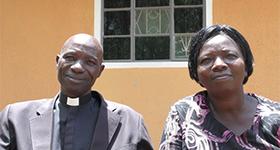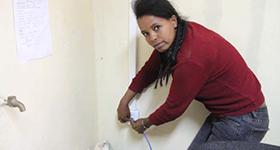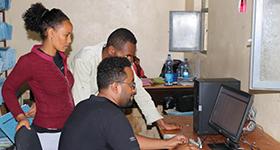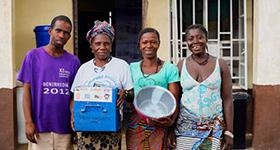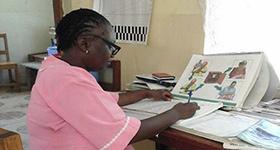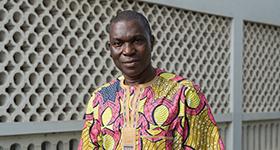Originally posted on USAID's Transforming Lives: https://www.usaid.gov/results-data/success-stories/ipc-and-wash-rehabilitation-bolster-health-care-sussex-community-0
Background
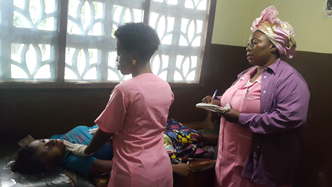
Head nurse Margarete Anthony, right, and colleague at the Sussex community health unit attend to a patient.
Sussex, a coastal fishing village in the Western Area Rural district of Sierra Leone, is one of many communities that were affected by Ebola. Before and during the disease outbreak in 2014-2015, the village’s health post for pregnant, lactating mothers and children under 5 was in a deplorable state. The facility had no running water because the only available water pump had broken down and not been repaired, there was no incinerator, the latrines were dilapidated, and there was no bathroom in the delivery room.
These conditions presented serious health risks for those delivering at the unit and discouraged many in the community from visiting the facility, while others took their children to hospitals in Freetown, about 30 kilometers from Sussex.
Intervention
In mid-2015, the Government of Sierra Leone devised an ambitious five-year post-Ebola health sector recovery plan focused on five areas: patient and health worker safety; human resources; essential health services; community ownership; and information and surveillance.
The recovery plan was launched in April 2016 with USAID support, which involves rehabilitating more than 100 peripheral health units in five priority districts through the Advancing Partners & Communities project. The rehabilitation aims to improve the facilities’ compliance with newly approved standards of infection prevention control and to increase access to a range of essential water, sanitation and hygiene components.
Outcomes
After months of rehabilitation work, the health unit in Sussex, which serves about 2,000 people, now has three functioning clean toilets; one hand-dug well with submersible pump; pits for ashes, placentas and sharps (needles and other sharp materials); and a cement brick incinerator. The unit also has two new solar panels, bringing the total to five, to improve electricity supply and help channel water from the pump to the storage tank.
“The lack of basic WASH [water, sanitation and hygiene] services compromised our ability to provide safe care and presented high health risks for the newborn. But all that is over now.”
“The lack of basic WASH [water, sanitation and hygiene] services compromised our ability to provide safe care and presented high health risks for the newborn. But all that is over now,” said Margarete Anthony, head nurse at the Sussex community health unit.
Health workers have received a number of trainings focused on safe delivery and child care, and the community is fully involved in the management of the facility through a committee. A regular janitorial service by the nurses and volunteers ensures cleanliness and hygiene. The number of daily patients has risen from an average of five before the project began to an average of 12 after the rehabilitation.
The USAID project, which ends in June, has renovated a total of 110 peripheral health units in the districts of Bombali, Port Loko, Tonkolili, Western Area Rural and Western Area Urban. Health services for more than 2 million Sierra Leoneans have improved under the project.
USAID’s post-Ebola efforts in Sierra Leone include rapid rehabilitation of health facilities in Ebola-affected regions, and motivating communities to adopt healthier behaviors and work together with health facilities.

